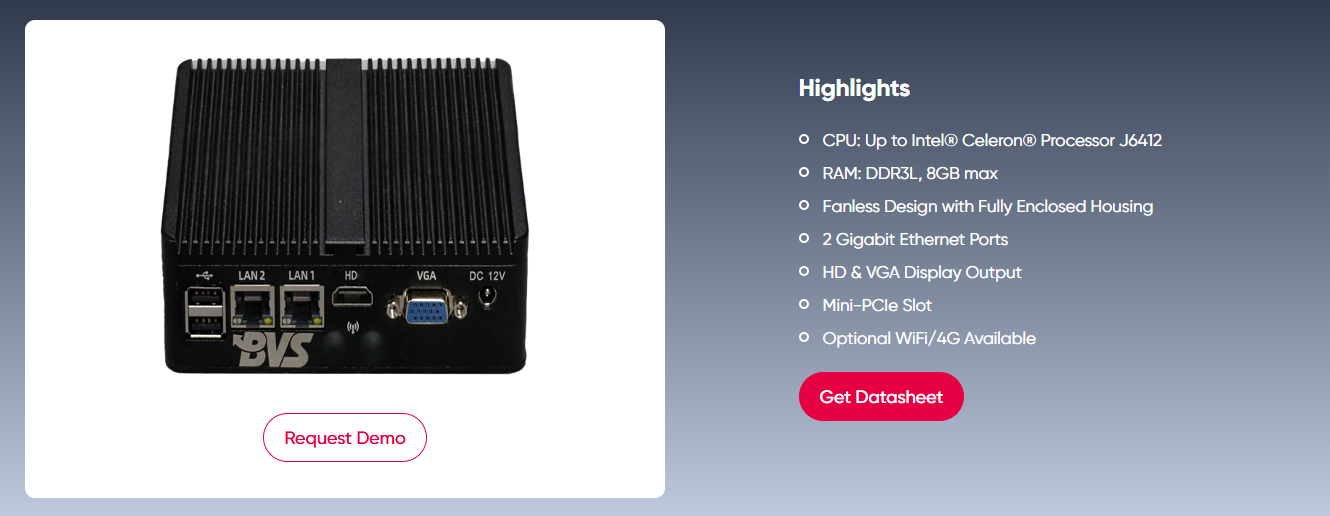In the ever-evolving world of technology, machine learning (ML) is at the forefront of driving efficiency and innovation, particularly in industrial settings. Industrial embedded computers play a crucial role in this landscape, serving as the backbone for executing machine learning algorithms and optimizing manufacturing processes. This article explores how industrial embedded computers support machine learning, looking into specific use cases where they enhance data processing, predictive analytics, and real-time decision-making, ultimately contributing to more efficient operations.
Industrial embedded computers are specialized computing units designed to operate in harsh environments, providing reliability and real-time processing capabilities. Unlike general-purpose computers, these systems are built to integrate seamlessly into manufacturing equipment, handle data from various sensors, and execute machine learning algorithms on-site. In the context of machine learning, their compact design and powerful processing capabilities make them an ideal solution for real-time data analysis and decision-making.
The role of industrial embedded computers in machine learning goes beyond simple data handling. They are designed to manage high-speed data input from multiple sources, which is critical for machine learning applications that require continuous, reliable data streams. Their ability to process data locally (edge computing) means that important decisions can be made faster, reducing latency and allowing for real-time automation and improvements in manufacturing processes.

Machine learning is highly dependent on vast amounts of data, and industrial embedded computers are adept at handling these requirements. By processing data at the source, these computers help reduce the workload on cloud servers and minimize bandwidth usage. This is particularly important for machine learning models that rely on real-time data to deliver accurate insights.
For instance, in a smart factory, sensors are used to monitor the status of machinery, collecting data on parameters like temperature, vibration, and energy consumption. Embedded computers collect this data, preprocess it, and use machine learning models to identify anomalies that could indicate equipment failure. This immediate analysis helps prevent costly downtime by allowing maintenance teams to act before a failure occurs.
The edge computing capability of industrial embedded computers ensures that data is processed where it is generated, leading to faster analysis and response times. This on-site data analysis is vital for applications that require instantaneous action, such as quality control in a production line, where defects need to be detected and corrected in real time to avoid wasted materials and time.

Predictive maintenance is one of the key areas where machine learning, powered by industrial embedded computers, is making a significant impact. Predictive maintenance uses machine learning algorithms to analyze data from industrial equipment and predict when maintenance should be performed. This proactive approach prevents unexpected machine breakdowns and extends the lifespan of machinery, ultimately saving costs.
In a manufacturing setup, embedded computers are used to monitor different operational metrics continuously. They run machine learning algorithms to predict potential failures based on historical and real-time data. For example, vibration and heat data collected by embedded sensors can be processed by an industrial embedded computer to predict bearing failures in a motor. By doing so, maintenance can be scheduled at the most convenient time, reducing downtime and maintaining operational efficiency.
Additionally, predictive analytics helps optimize inventory management for replacement parts. Machine learning models running on industrial embedded computers can predict when specific parts are likely to fail and ensure the correct parts are available. This helps maintain lean inventories and reduces the costs associated with overstocking spare parts.
Real-time decision-making is crucial for many industrial applications. In a fast-paced manufacturing environment, the ability to make instant adjustments can mean the difference between an optimized process and a costly bottleneck. Industrial embedded computers, with their ability to execute machine learning models at the edge, are essential for enabling these real-time decisions.
For example, consider a production line where embedded cameras inspect products for defects. Industrial embedded computers process the images and use machine learning algorithms to identify flaws. If a defect is detected, the system can immediately remove the product from the production line, ensuring that only quality products move forward. This real-time quality control is essential for industries like pharmaceuticals and food manufacturing, where precision and quality are paramount.
Smart Energy Management: In a smart factory, energy consumption is a major cost factor. Industrial embedded computers can analyze data from various energy-consuming devices and apply machine learning algorithms to optimize energy usage. By predicting energy demand and identifying inefficiencies, these systems help reduce energy costs and carbon footprints.
Automated Guided Vehicles (AGVs): AGVs are widely used in warehouses and factories for transporting goods. Embedded computers, equipped with machine learning models, enable AGVs to navigate complex environments, avoid obstacles, and make decisions about the most efficient routes in real time. This enhances the efficiency of material handling and reduces the need for manual labor.
Adaptive Manufacturing: In industries where product customization is key, such as automotive and electronics, machine learning helps in adaptive manufacturing. Embedded computers process data from customer orders and manufacturing equipment to adjust production parameters in real time, ensuring that each product meets specific requirements without slowing down the production process.

The benefits of using industrial embedded computers for machine learning applications in manufacturing include:
Reduced Latency: By processing data at the edge, industrial embedded computers eliminate the latency associated with cloud processing. This leads to faster decision-making, which is critical in dynamic industrial environments.
Reliability: Industrial embedded computers are designed to work in harsh conditions, including extreme temperatures, dust, and vibration. Their robustness ensures that machine learning applications run reliably, even in the most challenging environments.
Scalability: As manufacturing operations grow, more embedded computers can be added to the network to handle increased data loads and expand machine learning capabilities without overhauling the entire system.
Cost Efficiency: By enabling predictive maintenance and real-time quality control, industrial embedded computers help reduce operational costs. Fewer unexpected breakdowns, optimized energy usage, and lower defect rates contribute to overall cost savings.

BVS is a leading provider of industrial embedded computing solutions designed to meet the demanding requirements of modern manufacturing environments. Our products are engineered for reliability, scalability, and high performance, making them ideal for supporting machine learning applications in industrial settings. With a focus on enhancing data processing, predictive analytics, and real-time decision-making, BVS helps businesses optimize their operations and stay ahead in the competitive landscape. Discover how our industrial embedded computers can transform your manufacturing processes by visiting BVS.

Click to confirm
Cancel